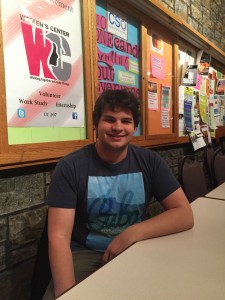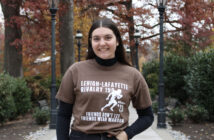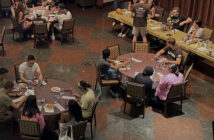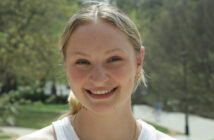At Lehigh, the words “Greek life” tend to be associated with chapters recognized by the Office of Fraternity and Sorority Affairs, or groups residing on the Hill. However, an entirely different group of chapters is also part of Lehigh’s Greek culture and environment.
The Lehigh chapters of Alpha Omega Epsilon, Alpha Phi Omega, Sigma Phi Delta, and Phi Sigma Pi are just some of the student-run Greek organizations that are similar in nature to the OFSA-affiliated chapters, but differ in their mission, focus and operations.
Tim Wilkinson, the senior assistant dean of students and director of the Office of Fraternity and Sorority Affairs, said these organizations are not part of the OFSA. Fraternities under the OFSA are part of either the Interfraternity Council, the Panhellenic Council or the Multicultural Greek Council.
He said students in these chapters reached out to the OFSA and Student Activities, and the offices are in the process of determining who will work directly with them.
“We are based on fellowship, scholarship and leadership,” said Andrew Shapiro, ’16, the president of Phi Sigma Pi National Honor Fraternity. “Those three major tripods are what our events are mostly based on.”
This is a theme among these non-OFSA Greek organizations. For example, Alpha Phi Omega, a national service fraternity, values friendship, leadership and service, according to its national website.
Additionally, Sigma Phi Delta is an all-male engineering fraternity whose members dedicate themselves to science, friends and duty. Alpha Omega Epsilon, a professional-social sorority for women engineers, emphasizes professionalism, sisterhood and community service.
Based on their mission or focus, some of these groups have different or more specific requirements for joining their chapters, compared to the requirements that the OFSA’s organizations must abide by.
“Speaking for all of the professional-like fraternities, it’s harder,” said Robert Hergüner, ’15, the president of Sigma Phi Delta. “We have a very specific target group. You need to be an engineer,

Levent Herguner, President of Sigma Phi Delta, sits in the University Center on Saturday, March 28, 2015. Sigma Phi Delta is an engineering fraternity that has their chapter meetings on Sunday afternoons. (Raven Atkins/B&W photo)
you need to be a guy and you need to be a second semester, passed freshman. And you need to be looking for the type of organization that we are.”
The fraternities and sororities associated with OFSA do possess some similar requirements. According to Lehigh’s Student Affairs website, a first-year student may not join Greek life until his or her second semester. He or she must also have passed at least 12 credits and have a minimum GPA ranging from 2.25 to 2.5, based on the governing council. Each chapter also has its own individual standards for membership.
Just as the chapters on the Hill host campus events and promote bonding, these Greek student organizations do the same. They participate in activities such as yoga, tea tasting, ultimate frisbee, and whatever else fits the interests of their members.
Some of the groups also host professional events, which help promote good business skills and other useful tools to further their careers after Lehigh.
Wilkinson said these groups are in many ways similar to the chapters on the Hill because they have national offices, similar missions and comparable new member education programs. However, he said they all function differently throughout the country.
While Greek organizations recognized by the OFSA have a formal recruitment process, these organizations are free to recruit however they like, such as hosting a table at the club fair and holding events on the University Center front lawn.
Some groups have a more formalized process for recruitment, which includes voting on potential new members, while other organizations allow anyone to join.
Amalia Cote, ’17, the public relations secretary of Alpha Phi Omega, said her organization has a table at the club fair where people can sign up to join. She said she was able to get her friends to join since Alpha Phi Omega doesn’t restrict its membership through a formal recruitment process.
She also said people who join still have to pledge, but the process is focused on learning about the fraternity and its purposes.
Alpha Phi Omega takes a different approach by being a co-ed, community-service-oriented fraternity.
“Alpha Phi Omega is community service based,” Cote said. “You have to do 14 hours of community service a semester. It seems more like it’s under the club category than a sorority or fraternity you would see on the Hill.”
One of the major differences between these groups and the OFSA chapters is the social aspect.
“To be able to enjoy the Greek lifestyle, but also taking your major and your school work seriously at the same time, it gives people like me who maybe aren’t as comfortable with the party scene the opportunity to be a part of something they otherwise wouldn’t have joined,” Hergüner said.
Wilkinson said these groups tend to focus more heavily on service and personal professional development instead of the social aspect, which causes them to work more with campus activities.
“I think each organization is a great organization based off what the individual is looking for,” Wilkinson said.
Another difference is the ability to be a member in multiple groups. Involvement in other organizations is supported and poses no conflict. Some members are also members of an OFSA chapter, in addition to many other student clubs or groups.
“There are no restrictions at all,” Shapiro said. “We have a lot of sorority sisters on the Hill that are still a part of us. We have a lot of members of APO, we have some members of SPD. We welcome it. The number one thing we pride ourselves on is we are such a diverse group. We want new and interesting people that are involved in other things because it brings that into our organization.”






Comment policy
Comments posted to The Brown and White website are reviewed by a moderator before being approved. Incendiary speech or harassing language, including comments targeted at individuals, may be deemed unacceptable and not published. Spam and other soliciting will also be declined.
The Brown and White also reserves the right to not publish entirely anonymous comments.